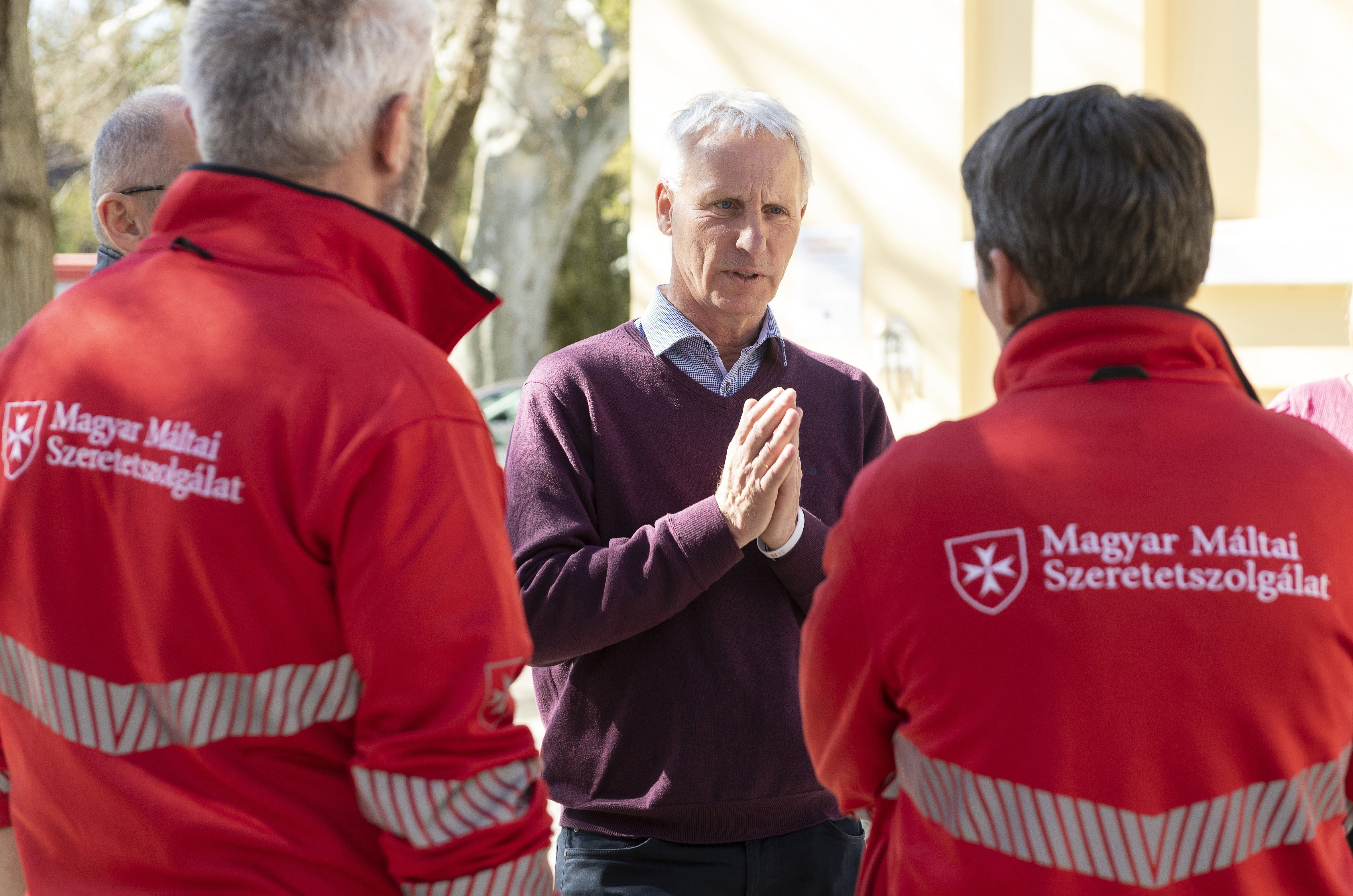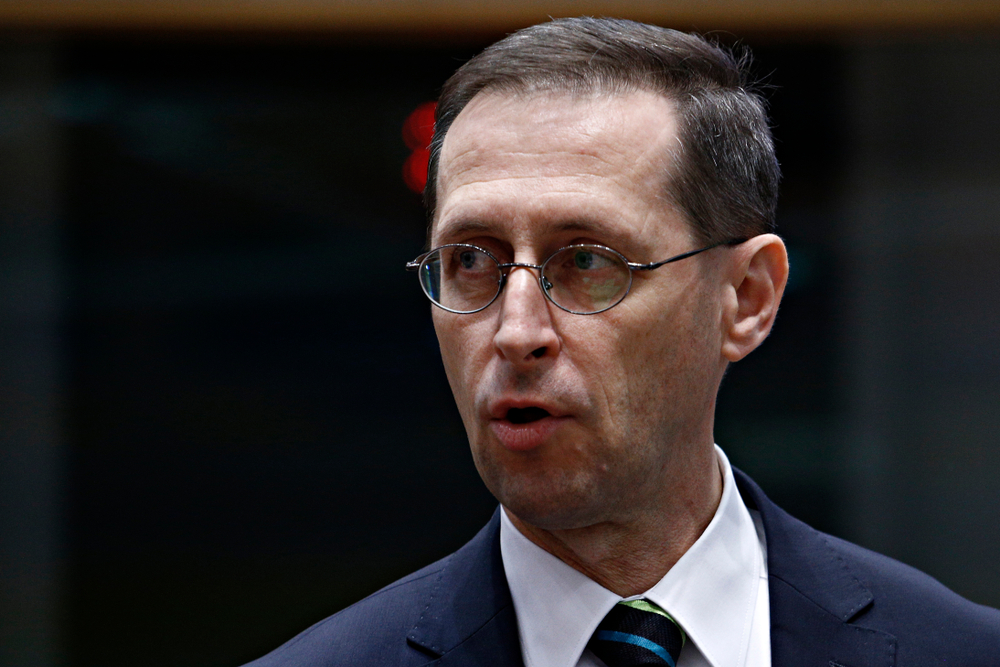Orbán Offers to act as the Peacemaker

Minister of State for Church and Ethnic Relations of the Prime Minister’s Office Miklós Soltész, who is also chairman of the National Humanitarian Coordination Council, talks with staff of the Hungarian Maltese Relief Service in Beregsurány (316 km northeast of Budapest, close to the border with Ukraine) on April 13. Hungary has done a remarkable job in assisting refugees from Ukraine, he said, adding, “there have been many times when some Ukrainian politicians, including the Ukrainian president, have made unkind attacks on Hungary.”
Photo by Attila Balázs / MTI.
Prime Minister Viktor Orbán has reaffirmed Hungary’s future as a member of the European Union and NATO at an international press conference on April 6 while restating the government’s position on the war.
“We continue to see Hungary’s future within the EU and want to play an active role in shaping the future of the European Union,” Orbán said. “We are and will remain a NATO member, and want to build a stronger army, thus strengthening NATO, too,” he added.
The prime minister also said he would use all of Hungary’s influence to bring about a ceasefire in Ukraine, prioritizing the safety of the more than 200,000 ethnic Hungarians living in Transcarpathia, Ukraine’s westernmost region.
During the same press conference, Orbán revealed that he had proposed an immediate ceasefire to Russian President Vladimir Putin during a lengthy phone conversation. Orbán told the press that he suggested that Putin come to Budapest for talks with the Ukrainian and French presidents and the German chancellor with the goal of reaching terms for an immediate ceasefire. Orbán described Putin’s response to the proposal as “positive.”
Minister of Foreign Affairs and Trade Péter Szijjártó referenced the proposal during a meeting with other NATO members’ foreign ministers in Brussels, also on April 6. The ministers agreed that ties between NATO and Russia “have never been as bad” and need to be “redefined,” Szijjártó said.
He added that “most members” agreed that cutting off all ties with Russia would be even more detrimental. Stressing that the alliance would not participate in the conflict, Szijjártó said there was a “broad consensus” among the allies on preventing the spread of the war beyond the borders of Ukraine.
Refugee Totals
Meanwhile, 601,000 people fleeing the war in Ukraine had arrived in Hungary so far, the prime minister’s chief advisor for internal security, György Bakondi, said on TV news channel M1 on April 14. Bakondi added that some 9,000-10,000 refugees from Ukraine are arriving in Hungary daily. From the beginning of the conflict until April 18, the National Directorate General of Immigration had registered 16,347 asylum applications in Hungary, according to a statement sent to state news agency MTI.
Accordingly, the continually growing number of refugees from Ukraine has started impacting the rental market in Budapest in recent weeks, Rentingo.com stated in its latest analysis on April 9. As supply prices had minimally adjusted to January levels, Budapest landlords asked for an average of HUF 158,000 for an apartment to rent in March. According to the analysis, this could cause a significant increase in apartment prices in the coming months.
Yet, as rents seem to be increasing as a consequence of the conflict, interest in second-hand properties for sale in Hungary declined by almost 30% in March compared to February. “The war situation is not only not diminishing, it is getting worse,” said Gábor Csizmazia, sales director of real estate brokerage Livlia. “It may follow that it will have stronger economic effects in the long run,” he added.
According to an April 19 report from business daily Világgazdaság, the proximity of the conflict is also adversely affecting domestic tourism. For instance, Air Canada, which only recently announced the resumption of its Montreal-Budapest flight, decided to cancel it in the days following the start of the war. Most Canadians and Americans are reportedly either postponing their trips or are instead traveling to England and France, which are at a safer distance from the war. Additionally, several large German groups in Hungarian hotels and restaurants have been canceled, citing the nearby armed conflict.
This article was first published in the Budapest Business Journal print issue of April 22, 2022.
SUPPORT THE BUDAPEST BUSINESS JOURNAL
Producing journalism that is worthy of the name is a costly business. For 27 years, the publishers, editors and reporters of the Budapest Business Journal have striven to bring you business news that works, information that you can trust, that is factual, accurate and presented without fear or favor.
Newspaper organizations across the globe have struggled to find a business model that allows them to continue to excel, without compromising their ability to perform. Most recently, some have experimented with the idea of involving their most important stakeholders, their readers.
We would like to offer that same opportunity to our readers. We would like to invite you to help us deliver the quality business journalism you require. Hit our Support the BBJ button and you can choose the how much and how often you send us your contributions.








